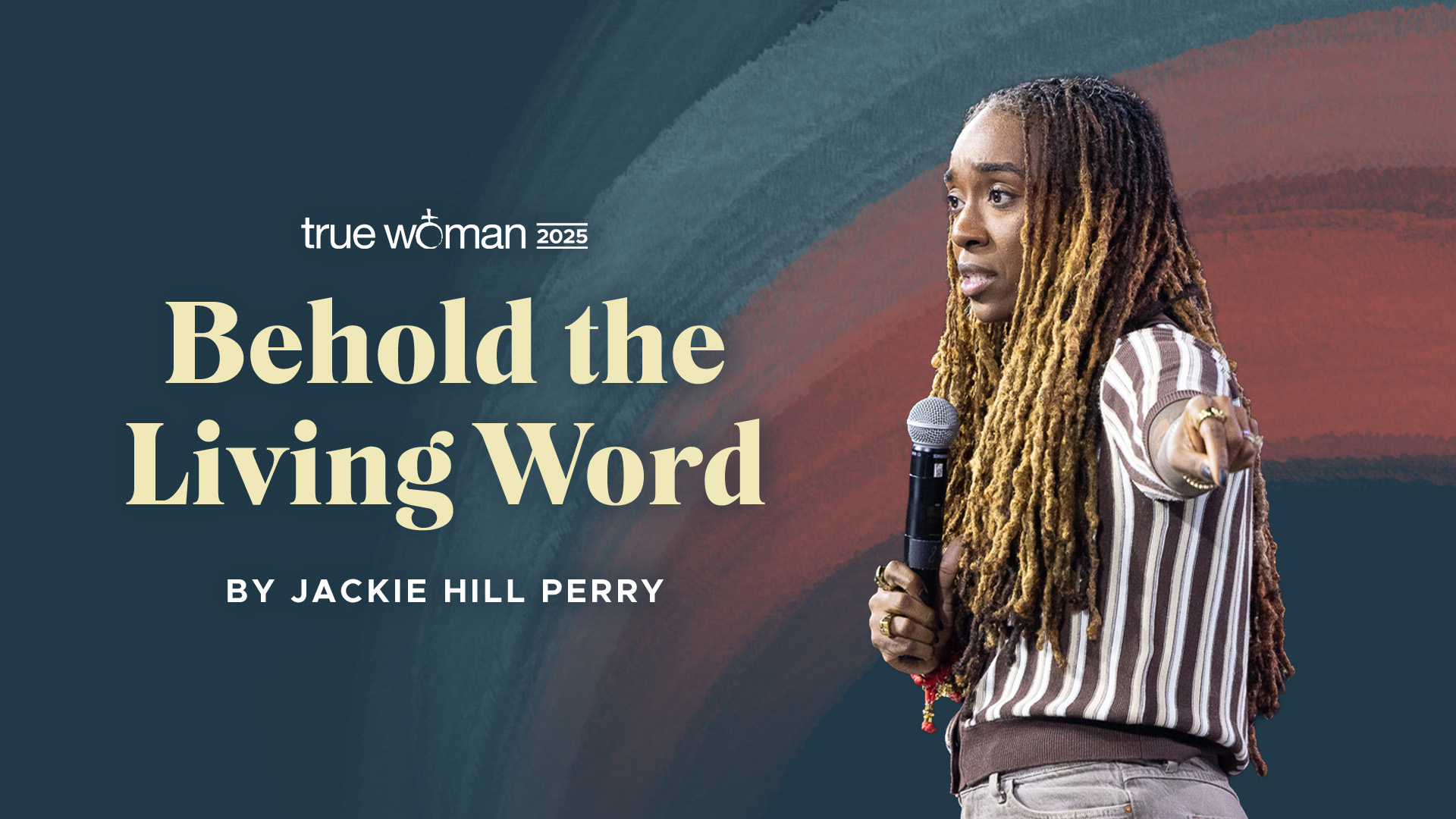
Dannah Gresh: Who initiated your salvation? How were you compelled to behold Jesus? Jackie Hill Perry reminds you . . .
Jackie Hill Perry: When you believed in Christ, when you received Him by faith, it was not by way of reason. You didn’t think your way into salvation. When you believed in Christ, it wasn’t because you were born or noble birth or because your parents were Christian. It is because God saw you swallowed up by darkness to say, “Let there be light.”
Dannah: This is the Revive Our Hearts podcast with Nancy DeMoss Wolgemuth, author of Heaven Rules, for November 13, 2025. I’m Dannah Gresh.
Nancy DeMoss Wolgemuth: Last month at True Woman ’25, we were blessed to hear so many powerful, anointed messages. And this one you’re about to hear from Jackie Hill Perry—well, it was a special one.
Jackie doesn’t need much introduction. She is the author of several books and Bible studies. She and her husband, Preston, have four children and live in the Atlanta area.
And just a personal note about something that particularly affected me about Jackie’s message is how much time, and thought, and prayer she gave to this message. She was working on it for long in advance, but even the day of, Jackie was so prayerful about wanting to give what was the Lord’s heart and the Lord’s mind for this message. This was convicting to me . . . and encouraging as well! The fruit of that was seen in the response to her message.
Now, I don’t want to give you any spoilers since you’re about to hear part one of Jackie’s message now. But I will tell you this, by the end, women were pouring to the front of the room in droves, kneeling before the Lord in prayer—some of them prostate and calling out to the Lord in praise and prayer and confession— some waving their white flags of surrender. We had those “Yes, Lord!” hankies that we use at True Woman. We could see plenty of those. And what we were all doing was beholding Jesus with fresh, revived vision. I can’t wait for you to hear the whole message today and tomorrow. Let’s listen to my friend, Jackie Hill Perry.
Jackie: I’ve always really enjoyed how the Bible begins. Because even though the Lord saved me in 2008, I didn’t start in Genesis. I didn’t start in Exodus. I definitely was not about to start in Lamentations. When I got saved and wanted to figure it out where I should start in the Scripture? I started in Matthew. That seemed like a safe book. But personally, I didn’t have too much fun over there because I just wasn’t expecting all the parables. I just didn’t know what to do with that. It was about sixteen parables a chapter, and so I just moved on. I know God’s Word is God breathed, but I just at the time, I didn’t like it. I love it now.
So eventually, I found myself in John, and while I was in John, I stayed there for a few months. I didn’t know why, but it was something about the book of John that really struck me, that really captivated me. I think it might have been a very simple thing. I think when I read the book of John, I saw God.
At some point I decided to get out of John to go backwards—past Luke, past Mark, past Matthew, past Malachi, past Zechariah and the rest of them, until I ended up eventually finding myself at the beginning, in Genesis.
The Bible began in a way that I didn’t expect because I guess I thought that the book that reveals God would start a little crazy or something. I thought that it would at least give me a description of the Lord acting like Zeus—you know, throwing lightning bolts into the sky and throwing the sun into the thing, and then scattering stars, and taking His physical hands making dirt and water and light and things to just start this Bible party off right. But when I read Genesis 1, none of that happened, because none of that happened, Hermeneutics 101. It said this,
In the beginning God created the heavens and the earth. The earth was without form and void, and darkness was over the face of the deep. And the Spirit of God was hovering over the face of the waters. And God said, “Let there be light,” and there was light. (Gen. 1:1–3)
I think what’s so enjoyable about those two sentences is that we are given a glimpse of what God’s word can do. At that time, when I didn’t know anything about cross-referencing, I had no idea that the book I just spent all this time in, the book of John, that he was building upon Genesis when he was writing his letter. I wasn’t trained yet to see the similarities between the two and how John chapter 1 is clueing us to the beginning of Scripture when John says, “In the beginning . . .”
But there’s a difference because Genesis 1 goes on to talk about the created order being generated by the word of God. And John decides to talk about a word too, but this . . . I’ll just read it. He says:
In the beginning was the Word, and the Word was with God, and the Word was God. He was in the beginning with God. All things were made through him, and without him was not anything made that was made. (John 1:1–3)
I mean, I love that because John is telling us that there is a Word that was there before Genesis 1 was written, before the sun was made, before the stars were born, before time was a thing, this Word was here. This Word is therefore eternal. This Word is also with God, as in near Him, as in alongside, as in, in relationship with God . . . and yet distinct from Him.
And this Word was distinct from God and God all at the same time. And everything that was made—like the sun, like the stars, like the earth, like Adam and Eve and everything else—has its origin in this Word.
When you read stuff like that, you can’t help but step back and say, “John, sir, who is this Word? ‘Cause I would like to meet Him.” Thankfully, he tells us in John chapter 1, verse 14, when he says,
And the Word became flesh and dwelt among us, and we have seen his glory, glory as of the only Son from the Father full of grace and truth.
Tonight, we are going to behold the Word. Tonight, we are going to behold Jesus:
- the Jesus who was in the beginning
- the Jesus who was with God
- the Jesus who is God
- the Jesus through whom the heavens and the earth were created
- the Jesus who became flesh and dwelt among us
- the Jesus who is full of grace and truth
Let’s pray, Lord, we thank You. We thank You for Your Word. We thank You that Your Word has power. We thank You that Your Word works. We thank You that Your Word reveals to us Your Son so that we would behold Him and believe Him and have life in His name. We pray that Your Holy Spirit would be active in the room, that You would convict where necessary, where You would confront where necessary, that You would renew minds and open and soften hearts.
I pray, God, that You would help us see You, help us love You, help us delight in You, help us know You. I pray even that You would give us energy to receive Your Word. I pray that You would give us humility to receive Your Word. I pray that You would just help us to respond to Your Word. Help me to communicate Your Word. We love You for all that you have done for us. In Christ Jesus’ name, Amen.
When I started seminary a few years ago, the very first class I took was called Theological Research and Writing, which is basically a class for anybody that wants to write a paper that doesn’t sound stupid. Literally. In that class, we spent a lot of time on the idea of a thesis statement—how to develop a thesis statement and how to identify a thesis statement. A thesis statement is a short statement that communicates the main argument or point that someone is trying to make.
What I appreciate about John is that his thesis is not that hard to find. When you open up John and flip to chapter 20, he tells us the entire point of this book that he’s writing. He says,
Now Jesus did many other signs in the presence of the disciples, which are not written in this book [thesis]; but these are written so that you may believe that Jesus is the Christ, the Son of God, and that by believing you may have life in his name. (vv. 30–31)
In other words, every verse, every chapter, every story is written to help you behold Christ as He is and not as we would prefer Him to be, so that we would believe and have life in Him. Whereas Matthew begins his book with a genealogy and Mark begins his book with a prophecy and Luke begins his book with a greeting to Theophilus; John begins his book with insight into the nature of Christ. He says that Christ is the Word who was in the beginning with God, and who is God, meaning: He is the Logos. He is the Word.
I think that can seem odd to conceptualize a person as a word. We handle words all day long. We text, we email, we talk, and we read. Words are a central part of the human experience. And we all know what we know about words is that words are a means of communication. Even now I am using words to communicate God’s Word to you.
The older I get, the more I realize that words communicate ideas, yes, but words have additional uses too. Words help me understand the nature of the person that’s talking to me. Words tell you something about the person that spoke them.
For example, if you lie to me, you might not be a liar-liar, but you’re definitely a liar. I ain’t gonna say you’re a liar-liar, you’re just a liar. And that’s because if the words you spoke to me were not true, your dishonest words revealed that you’re a dishonest person. This means that words have a revelatory function.
I bring that up because the whole point of John’s letter, remember, is that you would behold, that you would see Christ. The whole point of this talk is that you would behold, that you would see Christ. The whole point of this conference is that you would get back in your Word so you can see Christ.
So how does communicating Christ as the Word accomplish that task? This is how, because when you read that God said, “Let there be light.” God used a sentence to create the sun, meaning God didn’t need hands and tools and resources to make anything. He just used words and His words had the effectual power to make something out of nothing.
When you read that by the Word of the Lord, the heavens are made, do you see anything? Yes, you see God. God’s words reveal God’s nature. So imagine being a Christian in John’s day and opening the scroll to read that not only was the Word in the beginning with God or how the Word was God, but that the Word took on flesh and dwelt among them. What would you think that means?
It would mean that the Word, which represents God’s self-revelation, has not come to us now through a prophet, or has not come to us now through a vision, or has not come to us now through a dream. But God’s ultimate revelation has now come to us in the person of Jesus Christ. He is the Word that makes God’s nature known in creation. A commentator said:
When the Word became flesh, God became man. The Bible says that no one has ever seen God. God the only Son who is at the Father’s side, He has made Him known.
I haven’t taken any Greek classes yet. So I don’t know a whole lot of that, but what I do know is that “may be known” in the Greek is the same word we get the term “exegesis” from. I love sitting under the sermons where somebody gets a hold of a text that I wanna see, that I wanna understand. And I love when people don’t hide God’s words from me. I love when people don’t hinder the meaning from me. They don’t get in the way of its glory by twisting it or misinterpreting it. They simply explain what is there in the text, making what is there known. Why? So I can see it. They exegete God’s Word so we can see something that we did not have the ability to see before.
So when the Word says that no one has ever seen God, but that Jesus has made Him known, it is saying that Jesus is the exegesis of God. If you want to see God, if you want to know God, if you want to behold God, if you want to understand God, then look at Christ. He is the One who explains God.
The text says the Word became flesh and dwelt among us. John is not only hinting at Genesis in this passage, but now he is moving us into Exodus. We can know this again by looking at original languages. We can figure this out by setting aside the English for a second and peering at the Greek, which communicates that when the Word became flesh and dwelt among us, it means that the Word became flesh and pitched His tent. The word was “tabernacle” among us.
Remember Exodus chapter 25, for example, where God said to Moses, “And let them make me a sanctuary that I may dwell in their midst” (v. 8). The tabernacle represented a place where the human and the divine could meet up. Whereas Exodus 25 was a shadow, Christ Himself is the substance; He is the tabernacle. He is the temple. He is the sanctuary where divinity and humanity unite.
This all sounds good and great and worthy of worship, but it should also be shocking. ‘Cause as you reflect on the nature of the Word, it would actually be a little bit helpful to consider the nature of the people the Word decided to dwell with. Look at verse 10 of John chapter 1.
The true light, which gives light to everyone, was coming into the world. He was in the world, and the world was made through him, yet the world did not know him. He came to his own, and his own people did not receive him. (vv. 9–11)
How is it that the same person that made everyone can take on flesh, live on the earth, and no one notices? That the one who made everyone and everything is not known by the people He made, nor is He received by the people who had the promises and the prophecies and the covenants that prepared the way.”
It is this reality that God came into the world and nobody cared, that is an indictment on the human condition? The angelic hosts had to look down and be befuddled that the King was walking with sinners and nobody bowed. It was because they couldn’t see. Even the demons couldn’t help but recognize that the God of glory was there. But neither Gentiles nor Israel saw Him as worthy of not merely their attention, but their worship.
The question we’ve got to ask is why? It’s because all have sinned and fallen short of the glory of God. A fundamental aspect of the sinful nature is blindness.
Do you remember when you were blind? When the Word of God was preached to you and it didn’t move you. When the gospel was heard, and it didn’t change you? When you sat in church and lifted up your hands to worship, but your heart was very far from Him?
I remember when I was eighteen. It was probably a year before my conversion. I was at a party or graduation party for a friend and, you know, I was in sin. I was just very high. I was just high out of my mind And at some point during the party, another friend that I knew in school, I knew her when she was in the world, I knew what she was ratchet, I knew when she was doing whatever she wanted to do. She got up randomly to tell her testimony. Why she chose the graduation party?
She started to talk about God and what He did in her life. As she did, she started to cry. And I genuinely remember sitting there staring at her confused, because I went to church growing up a little bit. I heard about Jesus. I had gotten baptized—just ’cause I said I wanted to, not ’cause I repented. I knew John 3:16. I knew all the stuff, so I wasn’t an atheist. I wasn’t opposed to hearing about God. I just couldn’t make sense or understand how God meant so much to a person that just talking about Him made them weep.
There wasn’t anything in me that resonated with her worship. There was no place in my heart that had that kind of love. If she would have gotten up and just started boasting about sex or about weed or about rebellion or about pride or about anger, I wouldn’t have been so confused, because she would have been boasting about what I actually loved. But when she made it her business to lift up the glory of Christ, I couldn’t make sense of it because I couldn’t see glory.
I was blind.
When the Word became flesh and dwelt among sinners, they did not receive Him, because they did not have the eyes to see. They did not have the ears to hear. And this is the condition of every single person that is born after Adam. We are all born blind because the Scripture says that the enemy has blinded the minds of unbelievers where they cannot see the gospel in the face of Jesus Christ until God in His mercy speaks the same word over us that He spoke in Genesis. When you believed in Christ, when you received Him by faith, it was not by way of reason. You did not think your way into salvation.
When you believed in Christ, it wasn’t because you were born of noble birth or because your parents were Christian. It is because God saw you swallowed up by darkness and decided to say, “Let there be light.” And then, suddenly there was! You no longer looked at sex or your body or your job or your Bible or education or marriage the same because your eyes were open to the God who has always loved you.
It is His divine initiative and salvation through the means of granting light that makes it possible for any of us to be called a child of God. Wherein now, now we see Him as good, as faithful, and as God.
Dannah: Wow, what a powerful God we serve. I’m so grateful he saw me in the darkness of my unbelief as a little girl many years ago and said, “Let there be light.”
We’ve been listening to part one of Jackie Hill Perry’s message from True Woman ’25. She reminded us that God is the initiator in our salvation. We cannot behold Him. We cannot behold His glory, until He opens our eyes.
If God has used Revive Our Hearts resources, radio broadcasts, or the True Woman Conference to help direct your eyes toward Jesus, would you consider joining our mission through financial partnership? We’d love to invite you to join our team of Revive Partners. These friends of the ministry commit to giving a certain amount each month and receive special Revive Our Hearts perks. If you’re interested in learning more, you can visit ReviveOurHearts.com/donate.
If you’d like to make a one-time donation, you can do that by visiting ReviveOurHearts.com or calling us at 1-800-569-5959. When you do, we’d love to send you the beautiful new Revive Our Hearts calendar for 2026. It’s filled with carefully chosen Scripture verses and quotes from Nancy’s book, A Place of Quiet Rest. I hope you’ll hang it in your home to help you remember truth each time you look at it.
Tomorrow, we’re hearing part two of Jackie’s powerful message from True Woman ’25. You won’t want to miss that. Please be back for Revive Our Hearts.
This program is a listener-supported production of Revive Our Hearts in Niles, Michigan, calling women to freedom, fullness, and fruitfulness in Christ.
All Scripture is taken from the ESV.
*Offers available only during the broadcast of the podcast season.






